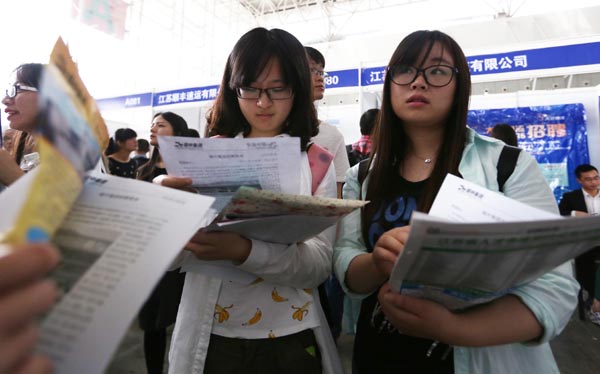 |
|
University graduates attend a job fair in Nanjing, Jiangsu province, this month. Nearly 40,000 candidates competed for 30,000 vacancies at the event. Provided to China Daily |
With college graduation ceremonies just weeks away, job hunting has entered its most intense period. Graduates are finding that although gender discrimination in employment has been officially prohibited for years, it remains widespread.
Cheng Qi, a geography major who will graduate in July from Jilin University, said she is one of the victims.
With her good academic performance and work experience, her parents thought she would be very competitive in the job market. But this is not the case. Cheng said she was rejected by many employers solely because she is female.
"Many companies do not even accept female graduates' resumes, let alone give them an interview," said Cheng, 23.
"A well-known State-owned company showed interest in me, but I still lost the chance in the last round. They recruited another male graduate. The human resources personnel said that if I were male, they would recruit me immediately.
"It's a heavy blow to my confidence, and I have even begun to doubt whether the efforts I have made over the past four years were worthwhile."
What Cheng encountered is common. Countless female students nationwide have had similar experiences.
A recent report released by the National Academy of Development and Strategy at Renmin University of China said that of males and females with identical resumes, the male graduates were granted interviews 42 percent more often than females.
The report was based on an experiment using 100 college graduates from Beijing. Each graduate was given two identical resumes, but one was marked male and the other female.
"Employment of college graduates is a hot issue in society, and gender discrimination is the topic of greatest concern," said Ge Yuhao, associate professor at the School of Labor and Human Resources at Renmin University.
"Speeding up the pace of prohibiting gender discrimination by law and policy, and increasing penalties for employers who violate the regulations, are practical channels to alleviate the problem," added Ge.
Zhou Li, 26, a 2013 graduate at Beijing Foreign Studies University who made a 15-minute video report on gender discrimination in employment as her graduation project, has deep feelings on the subject.
"The motivation for the video was based on my own and my friends' gender discrimination experiences when looking for jobs," Zhou said.
"Male students who get 60 points in an employment test will qualify, but the standard for females is 75 for the same test. It often happens that many females take preliminary tests, but few of them are left for the second round. Most of the male students are still there," she said.
"The employers I interviewed with said the relaxed one-child policy is a major concern for them when recruiting female graduates. The time for pregnancy, maternity leave and other problems related to baby care has greatly reduced female graduates' competitiveness," Zhou said.
Liu Minghui, a law professor at China Women's University, said the biggest problem is that there is no gender discrimination concept embodied in China's laws.
"Without the support of laws, it is really hard to appeal gender discrimination cases," said Liu, who represented Cao Ju in China's first case of gender discrimination in employment in 2013.
Cao won the lawsuit against a training school that rejected her on the grounds that the position was exclusively for males.
Liu took on two similar cases after Cao's. It took 14 months to file the first one, but only one month for the second.
"I am very happy to see that China's judicial departments are attaching increasing importance to the issue," she said.
Contact the writers through hena@chinadaily.com.cn
